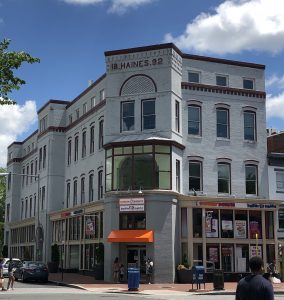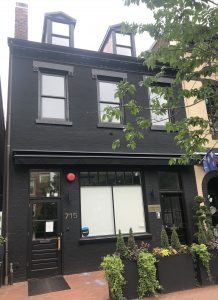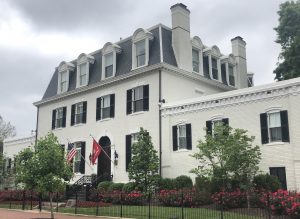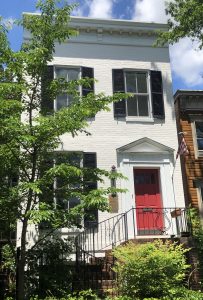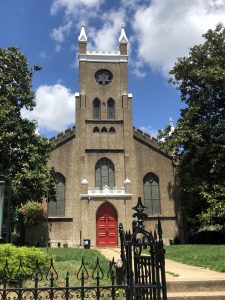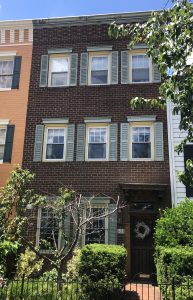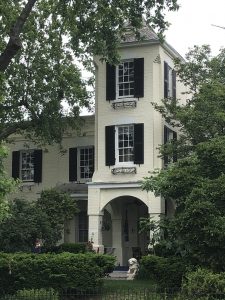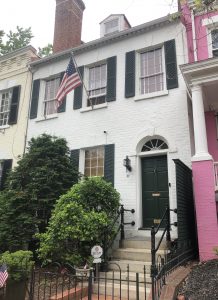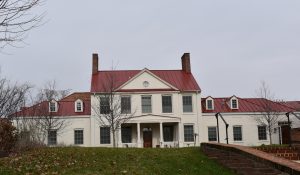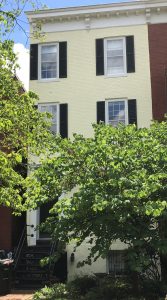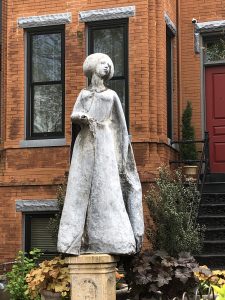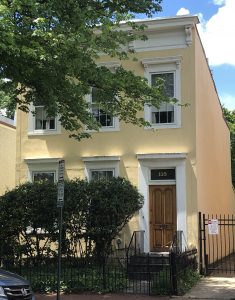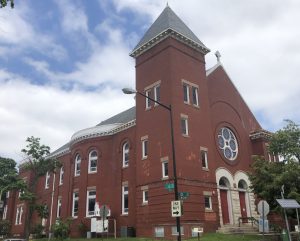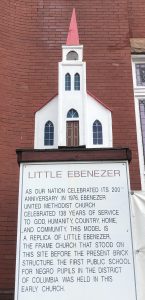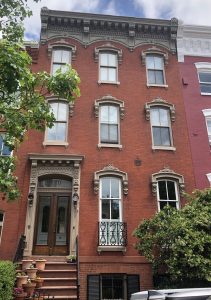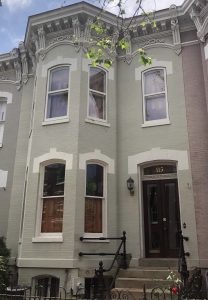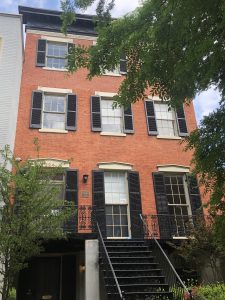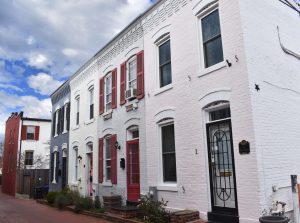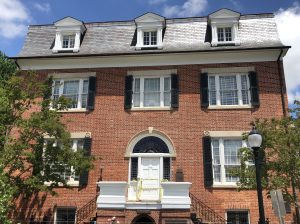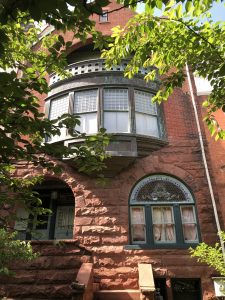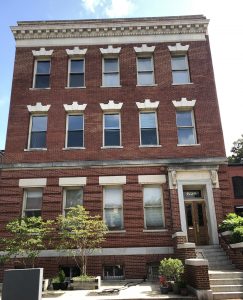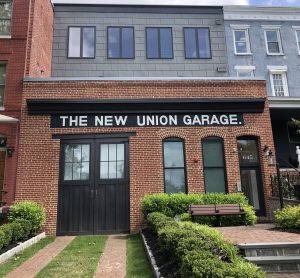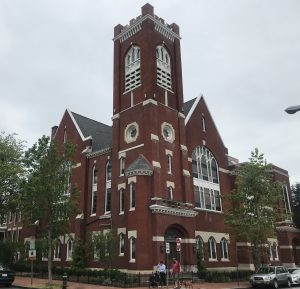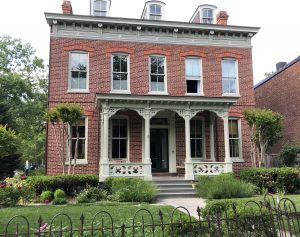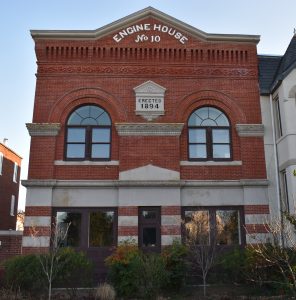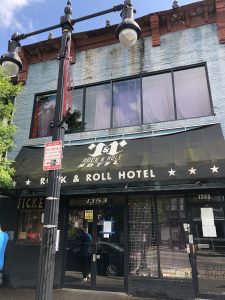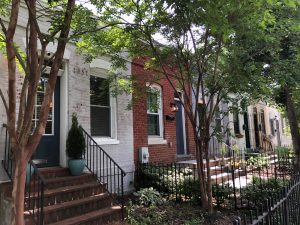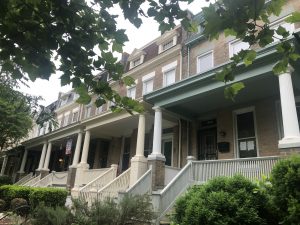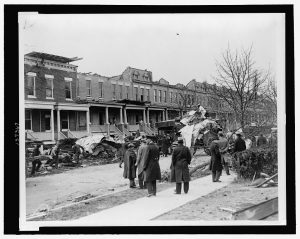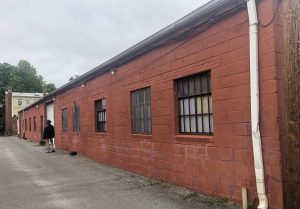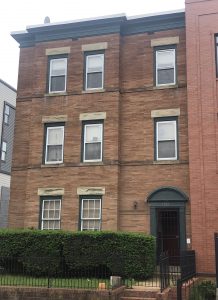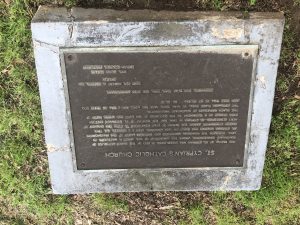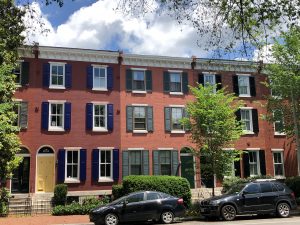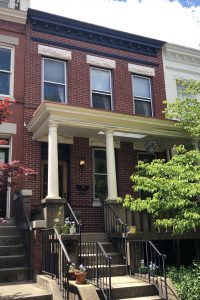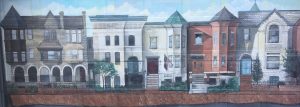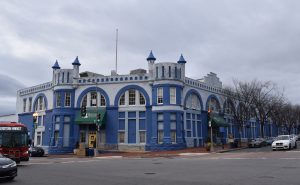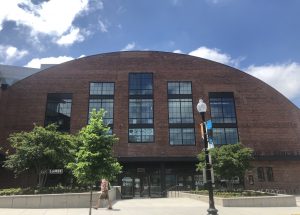To celebrate Capitol Hill’s rich history, we’ve arranged a walking tour of sites with historic significance. Some are important for their role in the history of our nation, others because the offer insight into the development of our community.
Download a Map/Worksheet [courtesy the Hill Rag, July, pages ?? & ??] and Photo List.
New members and donations are always appreciated! JOIN/DONATE
Many Thanks to our House Tour sponsors:
|
#1 – Haines Washington Store was built in 1892 by Elizabeth Haines, a successful local businesswoman and entrepreneur. Haines, a widow, moved to DC in 1882 and opened her first shop in Anacostia, expanded to the 1200 block of 11th St. SE, and finally built a larger store at the corner of 8th and Pennsylvania Ave. SE. At the time, the store was advertised as the largest store in the world built, owned, and operated by a woman. It comprised 65,000 sq. ft. on 2 floors and included 50 different departments. A third floor was subsequently added to the structure. The store survived an economic depression in 1893 and a fire in 1905. Elizabeth Haines sold the store in 1910; subsequent businesses housed in the building include Haines Department Store, Hachman Furniture Store, a Foot Locker, and currently Dunkin’ Donuts and Baskin Robbins. https://thehillishome.com/2011/12/lost-capitol-hill-elizabeth-haines-and-her-department-store/ |
||
|
#8 – The Maples mansion, 630 South Carolina Avenue, SE started as a pioneer’s cabin; William Mayne Duncanson, a British Army officer, purchased the property and built a frame house. Francis Scott Key bought the house in 1815. In 1838, it was purchased by Major Augustus A. Nicholson, and in 1856 by. Delaware Senator John M. Clayton, who added a ballroom. Emily Edson Briggs (1830-1910), one of the first woman journalists, covered the Civil War in a series of letters from “Olivia,” her pen name. In 1871, she bought the entire square including the house, naming it Maple Square, and lived there for 40 years. During the last several years of her life, her son, John Edson Briggs, began selling lots in Square 875 for development. Friendship House operated a settlement house in The Maples beginning in 1937. After Friendship House closed in 2010, The Maples was sold, and is now part of a condominium, duplex, and townhouse development |
|
#11 – The statue representing Olive Risley Seward (1844-1908) was sculpted in 1972 and is in the yard of a private residence. Risley Seward’s head is turned left and gazes at the square named after her adoptive father, William Henry Seward, U.S. Secretary of State (1861-1869) under Presidents Lincoln and Johnson. Following the deaths of his wife and daughter, shortly after the Lincoln assassination, Olive Risley became Sec. of State Seward’s confidant and travelling companion. To avoid gossip about their relationship and 40-year age difference, Seward adopted Risley. Following Seward’s death, Olive Risley Seward lived primarily in Washington, DC and was a co-founder of the Literary Society of Washington. In 1972, DC artist John Cavanaugh, lacking a photograph of Risley Seward, created his version of an idealized Victorian lady out of hammered lead. Cavanaugh died in 1985 of lung cancer, attributed to his longtime work with lead, a poisonous metal. https://thehillishome.com/2013/09/lost-capitol-hill-olive-risley-seward/ |
||
|
#18 – Alley near 217 A St. NE
|
|
#21 – 227 6th St. NE Barack Obama, 44th President of the United States, rented the first floor one-bedroom apartment in this red-doored building in 2006, while a Senator representing the State of Illinois, before announcing his campaign for the presidency. In a November 2008 interview on the show “60 Minutes”, Obama joked that the apartment had a “vintage, college-dorm, pizza, empty bottle feel to it”. A fire in 2007 did not cause structural damage to the property. |
|
#23 – The Lincoln Exchange was built in 1906 by the Chesapeake and Potomac Telephone Company to handle increasing demand for telephone service in the Capitol Hill area. It was built at 629 B St NE (before it became Constitution Ave). All telephone calls to and from the Lincoln Exchange were routed through this building, where telephone operators would connect callers with the intended subscriber. It was designed by the NYC architecture firm of Eidlitz and McKenzie, and the builder was John McGregor. Today the building is a condominium. https://thehillishome.com/2010/06/lost-capitol-hill-the-lincoln-exchange/ |
|
#24 – Built in 1906, The New Union Garage at 643-5 Maryland Avenue served as a garage for over 100 years until it was closed in 2013 and converted into 3 large condos. Developers recreated the historic façade and sign from an old photograph, and added two floors above the original first floor. Rumor has it that President Lyndon Johnson once had his car serviced here (per Urban Turf ). https://issuu.com/capitalcommunity
|
#25 – Smokehouse |
#26 – The Way of the Cross Church, founded in 1928, had grown quickly and in 1935 bought Baptist church at 5th Street and Virginia Avenue, SE. In 1963, church sold the building for highway construction and moved to the Ninth Street Christian Church building at 819 D Street NE. The Ninth Street Christian Church is a Gothic Revival Church. During the last quarter of the nineteenth century, leaders of many Protestant denominations believed that Gothic architecture was the architecture most suited to Christian worship. Influential architects such as Ralph Adams Cram led the way. A.W. N. Pugin, one of the leading authorities on Gothic architecture, promoted its moral and aesthtic principles as “the faith of Christianity embodied,”, and believed that stained glass windows were essential to the worship experience in a Gothic church. The Ninth Street Christian Church was built in 1897-1898 by the Disciples of Christ for their prosperous and fast-growing congregation, replacing a smaller church building constructed on that site only six years earlier. Five architects competed for the commission. This large church, planned to seat 800, is two stories of red brick and stone with a tower on the corner. Preliminary plans called for a slate roof, which was likely the building’s original appearance. In 2016 the church was sold and converted to condominiums. |
|
#27 – |
#29 – This firehouse, 1341 Maryland Avenue NE, built in 1894, is one of several firehouses designed by Leon E. Dessez (1858 – 1918). His best-known building is the Admiralty House at the Naval Observatory (1893). This firehouse is in the Queen Anne style, in pressed brick with deep corbelling, pilasters capped with stone carvings of acanthus leaves, and round arched windows. It’s now a private residence. |
|
|
#32 -These houses were included in these previous tours: 2015 and 2017 |
|
#33 – On November 17, 1927 an F2 tornado with winds at 125 mph moved through Capitol Hill, damaging the rowhouses on the 1300 block of A Street, NE. The houses were repaired and remain occupied. (Photograph courtesy LOC (LOT 12354-2) |
#35 – |
|
#36 – The small plaque in this triangle park commemorates St Cyprian’s Church, which stood on the corner of C and 13th Streets SE for over 70 years (across the street from the plaque). The church was established in 1893 and built in 1894 by the Black Catholics of Southeast Washington. In 1966, the St. Cyprian parish community merged with the parish of Holy Comforter to form the Church of Holy Comforter and St. Cyprian and the church was subsequently torn down. Currently, there is a row of 1970’s era townhouses where the church once stood. . https://thehillishome.com/2009/11/lost-capitol-hill-st-cyprians-church/
|
#37 – Coal House office |
#38 – Philadelphia Row
|
|
#39 Home of |
#40 – Waters Organ Company |
Waters residence |
|
#42 – The Uline Arena (later renamed the Washington Coliseum) opened in January 1941 and was a major indoor arena in Washington until the early 1970’s. With a capacity of over 8,000 people, it was the site of many major sports, entertainment, and political events, including: one of President Dwight D. Eisenhower’s inaugural balls in 1953; the first concert by the Beatles in the US in 1964 (less than 48 hours after their appearance on the Ed Sullivan Show); performances by The Ice Capades; home to the Washington Capitols basketball team (1940s until 1970); and a detention center for prisoners arrested during protests against the Vietnam war in 1971. In the early 1970s it was abandoned and used as a parking facility. To protect the building from efforts to raze it, it was added to the official protection list of the DC Historic Preservation Review Board in 2006 and listed on the National Register of Historic Places in 2007. It has since been renovated and currently houses offices and is home to the REI DC flagship store, the largest REI store on the east coast. |
||
Many Thanks to our House Tour sponsors: The Rob & Brent Group – TTR Sotheby’s, National Capital Bank, Coldwell Banker (Don Denton), Hill Rag
And Advertisers: Borger Management, Capitol Hill Day School, Chuck Burger Real Estate (Coldwell Banker), Gary + Michael Real Estate (Coldwell Banker), Pettie Tubbs Real Estate (Coldwell Banker), Congressional Cemetery, DC Access, EHT Traceries, Frager’s Ace Hardware, Meg Jeanne Phil Real Estate (Compass Realty), Jackie Libby Crystal – JLC Team (Compass Realty), Michael Halebian & Co. Rugs, Nishan Halim, DMD, Heather Schoell (Berkshire Hathaway/PenFed Realty), Horton’s Kids, Lawlor Architects, N&M House Detectives, Schneider’s of Capitol Hill – Fine Wines and Spirits, Judi Seiden Real Estate Group (Prudential Carruthers), Tech Painting Co., Wentworth Architecture Interior Design & Construction, Wilcox Electric, Yarmouth Management




